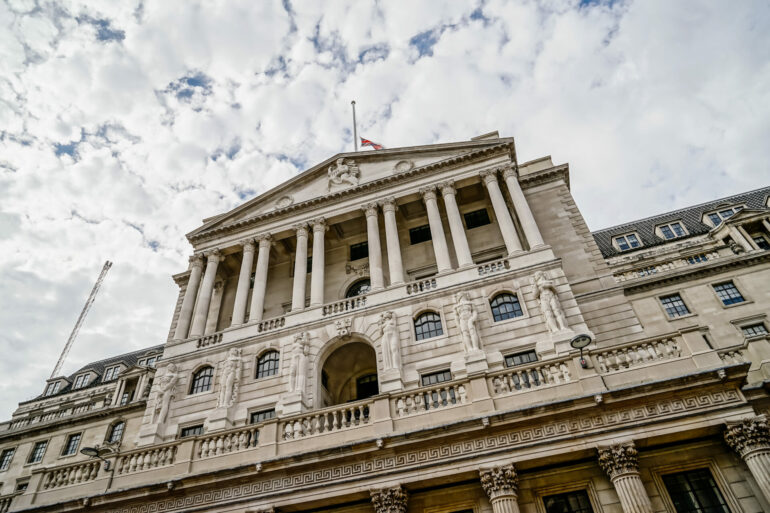Mortgage approvals for house purchases dropped by 14% in September as the effective interest rate on newly drawn mortgages increased to 2.84%, the latest figures from the Bank of England (BoE) show.
Despite this net borrowing of mortgage debt by individuals remained stable at £6.1bn in September.
At the same time consumers borrowed an additional £0.7bn in consumer credit, on net, below the additional £1.2bn borrowed in August – this was entirely driven by lower credit card borrowing of £0.1bn against £0.7bn in August.
Reaction
Emma Hollingworth, distribution director, MPowered Mortgages:
“The housing market remains volatile, with mortgage applications and approvals decreasing in September, as a result of wider economic turbulence.
“For those looking to buy homes, it is more important than ever that they seek out independent advice when it comes to choosing the right mortgage product for them. We are seeing a strong trend towards tracker mortgages, as well as longer term fixes, however the appropriateness of a product will depend on each individual’s specific circumstance – which is why expert guidance is so important.
“Equally important is the quick, efficient and, critically, safe processing of mortgage applications so that homebuyers opting for fixed rates can lock in before these move again. As we approach the Bank of England’s base rate decision on Thursday, where we could in all likelihood see another rise, it is important that brokers are supported with the right resources to help them process applications as quickly as possible.
“Technology has a critical role to play in this with AI-powered technology, in particular, helping to ensure that the application process is as smooth as possible for all involved.”
Steve Seal, CEO, Bluestone Mortgages:
“With inflation hitting a 40-year high this month, it’s unsurprising we’ve seen a dip in mortgage approvals. And, with last month’s mini-Budget triggering extreme swap rate volatility, we’ve seen lenders withdraw products from the market, which will undoubtedly make the homeownership dream harder.
“For those worried about the current lending environment and how it will impact their ability to get onto the housing ladder, we urge you to speak with a mortgage broker.
“Not only do these professionals have a vital role to play in supporting existing and would-be borrowers, but they can highlight the options available to suit their unique circumstances.
“It’s the duty of our industry and at the core of what we do to remind these customers that there’s still hope for them to reach their homeownership dreams.”
Mark Harris, chief executive of mortgage broker SPF Private Clients:
“Net borrowing remained consistent in September compared with August, while mortgage approvals for house purchases dipped while remaining above the six-month average.
“As expected, the average rate paid on new mortgages rose significantly, increasing by 0.29% to 2.84% in September, the biggest monthly increase since December 2021.
“Thankfully, the situation has eased for borrowers since the worst of the fallout from the mini-Budget. Lenders have been returning with fixed-rate mortgages pegged at more attractive levels as Swap rate volatility has calmed a little.
“With another interest rate rise likely this week, borrowers concerned about their mortgage should seek advice from a broker to find out what options are available.”
Jeremy Leaf, north London estate agent and a former RICS residential chairman:
“These figures are already starting to reflect house buying intentions before the mini-Budget of 23rd September.
“On the ground, the situation deteriorated further in the weeks following when uncertainty over mortgage payments came on top of worries about the increasing cost of living.
“Fortunately, most of those approvals are resulting in sales as buyers wish to take advantage of rates already secured which are unlikely to be repeated for some time.
“Mortgage rates are starting to come down too which has helped restore some of the lost demand albeit rather slowly but most sales are continuing, not collapsing.”
Simon Webb, managing director of capital markets and finance at LiveMore:
“Mortgage approvals for house purchases were down by more than 10% to 66,800 in September from the previous month and there was no change in net borrowing.
“This indicates we could be starting to see the housing market slowing down as the cost of borrowing increases.
“Base rates will rise again when the Monetary Policy Committee meets on Thursday likely moving up to at least 3%, a rate not seen since November 2008.”
Richard Pike, Phoebus Software chief sales and marketing officer:
“This is the first sign that housing is being affected by the current economic situation. The double hit of rising inflation and increasing interest rates is enough to give pause and, when finances are stretched, moving house falls down the priority list.
“We saw warnings of redundancies from estate agent chains last week, which reflects the ebb in confidence and restricts the number of properties coming to market. We are heading into a traditionally quieter time of the year, but there is still work to be done for brokers and lenders. This is an opportunity to look at affordability and assess where vulnerabilities lie.
“A proactive approach now is vital to ensure that the most vulnerable borrowers know their options and are managed through any difficulties in the coming months.”

Karen Noye, mortgage expert at Quilter:
“The signs that a housing price dip if not crash are starting to reveal themselves. The latest Money and Credit statistics from the Bank of England revealed that mortgage approvals for house purchases decreased significantly to 66,800 in September from 74,400 in August.
“If demand continues to come out of the market while people start to put their properties up for sale due to unaffordable mortgage or heating costs then we will see a natural reduction in price as it switches from a seller’s to a buyer’s market.
“Particularly as it starts to get colder, increased energy bills on top of eyewatering mortgages may make some homes simply unaffordable for people to stay in this winter.
“The ‘effective’ interest rate i.e. the actual interest rate paid, on newly drawn mortgages increased by 0.29% to 2.84% in September and this is likely just the start of a new higher interest rate environment we are entering into.
“Later this week, the Bank of England will likely once again rachet interest rates up to try and tame inflation.
“However, as it does that those trying to remortgage or get onto the ladder will find that they will have to pay significantly more than what they would have just a month earlier. Only those who have fixed into a longer term mortgages deals in the last few months will not suffer increased costs.
“While the housing market looks like it is already groaning under the strain of the cost-of-living crisis fortunately the statistics show that while there was a significant amount of borrowing in August (£1.2bn) individuals only borrowed an additional £0.7bn in consumer credit in September, which is the lowest level since December 2021 (£0.3bn).
“This is good news as if people start to load debt onto credit cards in the face of increased bills it could prove disastrous. This is laid bare by the fact the effective rate on interest bearing credit cards increased to 18.96% in September meaning borrowers using this type of credit could soon find themselves spiralling into debt.
Jonathan Samuels, CEO of Octane Capital:
“A dip in mortgage approvals was very much on the cards, particularly given the turbulence that rocked the sector towards the end of the September as a consequence of the government’s disastrous mini-budget.
“However, while it’s fair to say that the market has shifted down a gear or two, September’s level of mortgage approvals doesn’t sit far off the average level seen over the last 12 months.
“In fact, when you look at historic levels for this time of year prior to the pandemic property market boom, the latest sum of 66,789 actually sits marginally higher than the levels seen in September 2019, 2018 and 2017.
“So while today’s decline will no doubt sow further seeds of panic that a market collapse is on the horizon, what we’re currently seeing at present is very much a return to normality.”
Marc von Grundherr, director of Benham and Reeves:
“The latest decline in approvals will no doubt have been exaggerated to a degree, due to the knee-jerk response by the mortgage sector to reduce the level of products available following the government’s shambolic mini-budget.
“While we’ve now seen a degree of stability return to the market in this respect, it’s also important to note that we’re coming off the back of what is traditionally one of the busiest periods of the year for the UK property market.
“Therefore, it’s only to be expected that the level of buyers entering the market will start to cool gradually as we approach the end of the year.”
Chris Hodgkinson, managing director of House Buyer Bureau:
“Although the current level of mortgage approvals still remains higher than it has been at times in 2022, today’s drop is a significant one and really highlights the reduction in buyer demand being seen across the current market.
“For the nation’s sellers, this means less potential buyers fighting it out for their property, with the inevitable consequence being that they simply won’t achieve the same price as they may have six months or more ago.
“Despite some stability returning for buyers with a slight reduction to mortgage rates, this downward trend looks set to remain. So those hoping to sell their home this side of Christmas are best advised to act quickly in order to secure the best price possible, before this drop in buyer demand filters through to topline house price values.”

Stuart Wilson, chief executive officer at Air Group:
“The market mood music is changing tempo from day to day, and sometimes from hour to hour. With the reversal of the mini-budget earlier in the month and the Bank of England easing its controls, the economy is in a very different shape now compared to this September data. After August saw the highest rate for all consumer credit since 2019, the rise in September will come as no surprise.
“While in an ideal world people would be in a position to wait until things become more stable before looking to borrow, remortgage or move existing borrowing, this is simply not possible for many.
“Sound financial advice, however, remains the rock on which UK borrowers can build their finances. In the later life lending world, speaking to a specialist adviser who can talk you through all your options and the features and flexibilities of the products on offer is vital.
“Taking advantage of the options offered by modern equity release plans to make ad hoc interest payments, ongoing capital repayments or rebroke plans in as little as five years can help to manage the impact of higher rates.
“Advisers need to be speaking to their clients about their options and helping them to navigate this increasingly complex landscape.”
Colum Lyons, CEO of ID-Pal:
“The mortgage market is a volatile place and as rates change, brokers have to instantly react, coordinate last-minute product pulls and manage borrowers who need to get a deal over the line.
“In this type of environment, mistakes can happen. To stop fraud from being another challenge to deal with, brokers need a robust identity verification system to verify their clients.
“Online identity verification is key to preventing fraud at source in the mortgage market. Not only will it streamline the application process and bring back-office efficiencies, it gives brokers and lenders reassurance that they are meeting their AML and KYC obligations and that the necessary standards of safety and security are in place for handling personal data.
“At a time when the market is already so uncertain, simplifying and strengthening the identity verification process for both brokers and borrowers gives certainty and peace of mind.”
Jason Tebb, chief executive officer of property search website OnTheMarket.com:
“Net borrowing of mortgage debt by individuals in September remained consistent with the previous month and above the six-month average. However, approvals for house purchases, an indicator of future borrowing, decreased significantly.
“Our own figures show sentiment remained robust in September as 53% of properties were Sold Subject to Contract within 30 days of being advertised for sale.
“Buyers have less buying power as interest rates and the cost of living continue to rise. People move for a variety of reasons and will continue to do so, even in more challenging markets, but new properties coming to market must be priced realistically or are likely to struggle to sell and stick on the market.”




